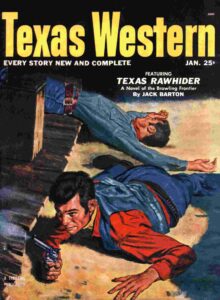
Launching a new pulp in 1953, as the last flakes of the once mighty pulp empires fluttered around the publisher’s offices, was a bold decision. What were they thinking? Here is an excerpt from the editorial in the first issue of Texas Western:
Here it is, readers, the magazine you’ve been demanding! TEXAS WESTERN is the latest addition to the THRILLING group of magazines. And it’s a mighty big, mighty exciting book about a mighty big, mighty exciting place—TEXAS!
…
TEXAS WESTERN is more than just another Western magazine. It’s a magazine about the founding of the richest, greatest, most dramatic empire in the world today—the Lone Star State! And it teaches those virtues which made Texas great and keep it great—loyalty, courage, straight shooting, straight talk and two-fisted action.
Did they succeed? Did Texas Western create a new market? Let’s find out in this review.
Read more: Craving hardboiled pulp? Try the first issue of Texas Western free, now at archive.orgThough the editorial stresses the Texan backdrop, there was nothing uniquely Texan in the contents. They could have been set anywhere in the West. What was different, though, was how adult the stories were.
The only Texan content is the opening non-fiction article on the sounds of Texas Longhorns by Texas born Ferris Weddle, which surprised me enough to go looking on Youtube for some recordings of longhorns. Here’s one that I think you’ll be interested to hear:
The lead novel (and for once it’s justified to call it that), is Texas Rawhider. At 68 pulp pages in length, it could be a slim paperback or one side of an Ace Double. I don’t believe this was ever published in that format, though, so the magazine is the only place you can read it. The author is Jack Barton, a pseudonym of Joseph L. Chadwick (1909-1987), a prolific writer of westerns who’s forgotten today. In his day, his books sold more than a million copies and he was a particular favorite of General Eisenhower, who had his books shipped from America to England during World War 2. Was Eisenhower a discriminating reader? You decide.
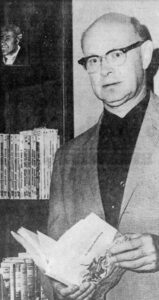
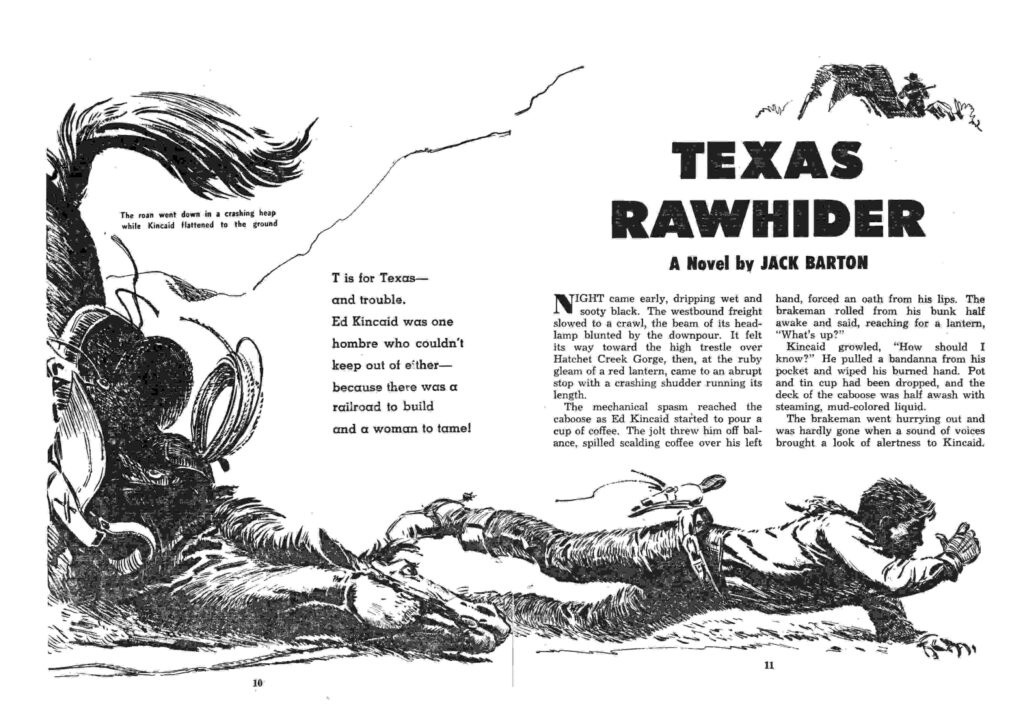
The Texas rawhider of the title is a tough as nails rancher who’s become a railroad troubleshooter after losing his ranch. He rides into town at the request of a syndicate of investors who’re building a railroad where they want it, before the big railroad company gets into their area and acquires right of way through their lands. The engineer is a handsome womanizer who’s run into our hero earlier, and stolen his girlfriend before marrying and abandoning her. There’s a young woman the engineer’s after, and our hero tells her about this abandoned wife, causing her to rise up in revulsion against the engineer. Our hero thinks the engineer might be selling out the syndicate to the big railroad by creating difficulties in building and driving up costs enough that the investors will need to bail out. Our hero’s only going to collect his fee if the railroad gets built. Tricky.
Chadwick keeps the plot moving quickly and throws plenty of twists at us and our hero, including a scene when the hero meets his ex-girlfriend. She professes regret, claims to love him, and offers herself to him sexually. He resists and finds out that she’s really still carrying a torch for the engineer, who is trying to get him out of the way by having the wife take up with him till the railroad is sold to the right buyer. There’s physical violence (well-described), sexual tension (ditto) and a crooked railroad owner who’s the reason why things are falling apart. Reads like a Gold Medal paperback; I’d say Eisenhower knew his escapist fiction.
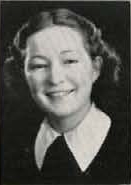
The Midnight Clear is a Christmas fairy tale written by A. C. Abbot, a pseudonym of Helen Abbot Meinzer (1918-1963). Idaho native Helen, the descendant of newspaper and printing shop owners, graduated with a masters from the University of Idaho and moved to Arizona after marriage. She wrote many stories for Ranch Romances and other western pulps; her two books are surprisingly hard-boiled westerns: Wild Blood (1951) and Branded (1953). This story is somewhat lighter in tone though there are multiple deaths.
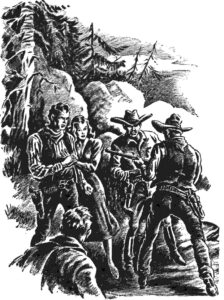
Woman from Tucson features a young man saddled with a no-good womanizing brother who periodically goes on alcoholic binges and returns with women who’re temporary inmates of their ranch. The neighbors are facing the depredations of horse thieves, and the brothers are suspected and warned.
The no-good brother walks into this scene with another woman, but this one refuses to perform her wifely duties unless officially married by a preacher. The acknowledgement of a single, unprotected woman’s perilous life on the frontier is very realistic as her desperate motivation for seeking any partner, however useless he might be. Unfortunately, three pages were missing from the issue I read so I can’t tell you if the climax is as good as the beginning. Which was good. Dean Owen is a pseudonym belonging to Dudley Dean McGaughey(1906-1986), another hardboiled writer with a handful of Gold Medal titles to his credit among the 100+ books he authored.
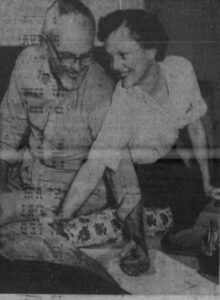
Tools of the Devil by California writers Bob and Jan Young is missing its first page. Seems to be a light comic tale of a lay preacher defrauding a conman. The husband and wife team of Robert William Young(1916-1969) and Janet Randall Young(1919-1994) started in the pulps and went on to write many books for children and young adults.
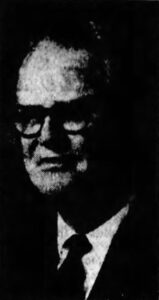
At the end we have The Shorthorn King by Henry Carlton Jones of Oklahoma. Henry Charles Jones(1906-1968) was his real name, and he had a career as journalist and advertising agency manager before becoming a writer and publishing poems and short stories. The story is a comic romance that manages to fill the remaining pages.
The article fillers are Texas facts, applied like mesquite liquid smoke to give the magazine a Texas flavor, and about as genuine. It’s an odd mix that feels like some of it was pulled together from odds and ends around the office, and some real hard-boiled stories that could have made this a contender for toughest western title. Too bad it didn’t last, Texas Western had only four issues before ceasing publication.
Thanks to the efforts of a small but dedicated group of scanners, this issue is now available for you to read online at archive.org.
I see Texas Western lasted only 4 issues in 1953, just long enough for the publisher to see that the circulation was simply not there. This publisher was one of the last to stop publishing the pulp format of 7 by 10 inches. They just had problems accepting the fact that the pulp era of over 50 years was finished and the future was the paperback and digest formats.
But even in the digest format, westerns were not a success except for Zane Grey Western for a few years. When Manhunt was a big success as a crime digest, they tried the same format with the western magazine, Gunsmoke but it was a big failure and only lasted two issues.
Western paperbacks were big sellers in the 1950’s, 1960’s and into the 1970’s, however. They were a lot cheaper to produce compared to the pulps also.
> This publisher was one of the last to stop publishing the pulp format
> They just had problems accepting the fact that the pulp era was finished
I wonder if that was wholly true. Pines had started a paperback line in 1942. Popular Library started out focused on detective/mystery, added westerns after the first hundred books came out.
> Western paperbacks were big sellers…into the 1970’s, however.
At Popular Library, most of the writers were the same names who’d been in the pulps. Same for the cover artists. Some of the stories and covers were recycled from the pulps, even. Ned Pines certainly got value for his money.
What didn’t work in digest form worked in paperback format.